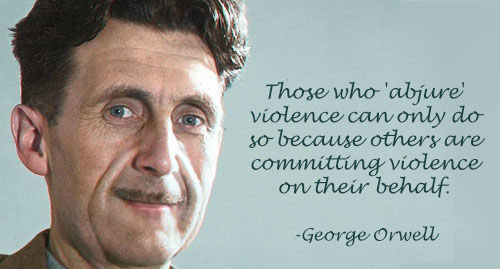Toward the end of the Parable of the Vineyard in Mark 12, the vineyard owner sends his son to collect the portion of the fruit due him from the farmers to whom he had leased it. After having sent numerous servants, all of whom had been disrespected, beaten, or even murdered, to accomplish the task, I would not have chosen this course of action. Rather I would have sent heavily armed soldiers…the “rough men who stand ready in the night to do violence on those who would harm us” whom George Orwell praised for protecting the pacifists among us. (“The “rough men” quote is not Orwell but another author describing a position Orwell espoused in his essay “Notes on Nationalism.”) But the Lord of the Vineyard had a different way of thinking than I do. He said, “They will respect my son” reasoning that whereas the farmers had not recognized the authority given by Him to a mere servant, they would certainly understand that his Son fully represented the Lord.
When I came across the Greek word ἐντρέπω (en-trep’-o) that in this case usually translated “respect,” I found it interesting to note that a more common translation is “turn about.” The word is a compound of the preposition meaning “in, into” and the verb “to turn.” Herodotus uses it to describe soldiers who “turn about the backs” to the enemy in order to flee. Since it’s in a passive voice here it means to “cause (someone) to turn about.” In I Corinthians 4:14 Paul negates the meaning of the participle form to say literally, “Not turning y’all about, I write these (things), but as my beloved children exhorting.” (Paul really loved his participles). In this case the word is usually translated “make ashamed.” So in my opinion a better translation of Mark 12:7 would be “My son will cause them to turn about.” or “My son will make them be ashamed.”
But they were not ashamed and they did not turn about. Neither did the enemies of Jesus who “perceived that he had told the parable against them.” The Pharisees would have arrested him on the spot, but they feared the crowds in Jerusalem would turn against them. At the time the crowds still respected Jesus, thinking him to be a Messiah who would conquer their temporal enemies for them. Soon the crowds would be turned about as well.
Today most of our rulers no longer respect the Son of God. Some of them still fear the crowd because right now the crowd is pretty much a coin toss proposition: 75 million on one side, 80 million on the other. I believe the day is coming when our rulers will conspire with radical elements on both sides of this coin to unite the mob in persecuting a minority who still respect the Son and the Lord of the Vineyard He represents.
But we don’t really have to worry about that. The Vineyard Owner is prepared to send his version of “rough men who stand ready in the night” to destroy those who have usurped His authority here. That particular battle is not ours to fight. “For we wrestle not against flesh and blood, but against principalities, against powers, against the rulers of the darkness of this world, against spiritual wickedness in high places.”
Jesus gave the disciples authority to cast out demons. I believe that authority extends to us. On at least one occasion when the disciples found they didn’t have the strength to cast out a certain demon, Jesus told them, “This kind cannot be driven out by anything but prayer.”
We are facing some extra tough demons these days. We need to fight our battles with prayer. I personally do not do this as much as I should. Using prayer to make our true enemies turn their backs and flee is how we can properly show our respect for the Son and everything He has done for us.



